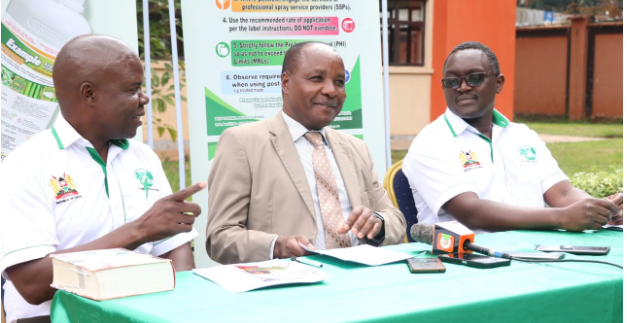
The Pest Control Products Board has urged farmers to strictly adhere to label instructions.
PCPB CEO Fredrick Muchiri said there is a need to adhere to good agricultural practices to safeguard food.
“Ensuring food safety is a collective responsibility and proper application is fundamental to protecting consumer health and the environment,” he said.
Muchiri admitted that the lack of extension services to advise farmers is a major challenge.
The plea by the CEO comes in the wake of troubling research from Egerton University that showed potatoes from Nyandarua county had high levels of pesticides, also known as Maximum Residue Limits (MRLs).
The researchers showed most of fat tubers from the county come loaded with residues of banned pesticides and boiling them does not help much.
They visited 275 randomly selected potato farmers and nearly all of them (98.8 per cent) used synthetic pesticides.
Most farmers used synthetic pesticides regularly, sometimes even weekly and many mixed different types together.
Only 12 per cent of the farmers actually followed the instructions on the pesticide labels.
Muchiri pointed out that some of the pesticides used by potato farmers in Nyandarua have not been approved to be used on tubers.
The Egerton University study showed that most pesticide residues were below the European Union and Codex maximum residue limits in potatoes.
He said the two pesticides are contact, meaning that they are only sprayed on leaves, and there is no way they would have been in contact with tubers.
“While the study purports to have evaluated the effect of common household processing methods such as frying, boiling, baking, steaming and roasting of potatoes on reducing pesticide residues, PCPB does not recommend any type of cooking or processing as a viable solution to address pesticide residue exceedance,” Muchiri said.
Others are following label instructions, appropriate timing and frequency, observing pre-harvest intervals, avoiding improper mixing and seeking expert advice.
Muchiri said there are gaps in agricultural extension services contributing to irresponsible usage.
The bill will establish the pest control products authority and align with constitutional and international standards, a move that will enhance food safety, environmental protection, public health and safeguard agricultural exports.
It will also strengthen collaboration with counties and boost extension services.
Muchiri said the agency has also made some strides in safeguarding food safety and maintaining agricultural exports following the completion of a state-of-the-art residue laboratory.
The lab is central to the establishment of a national pesticide residue monitoring framework, a collaborative initiative in Kenya designed to systematically monitor and manage pesticide residues in agricultural produce, ensuring food safety and compliance with domestic and international standards.
Muchiri said the residue lab will strengthen regulatory oversight by allowing PCPB to collect data and monitor compliance with maximum residue levels.
“The formulation laboratory conducts monitoring of the quality of the pesticides in the distribution chain to verify compliance with the set specifications and also contributes to the reduction of counterfeit pesticides in the Kenyan market,” Muchiri said.
However, he said, the cabinet has approved the draft Pest Control Products Bill, 2024, a move that will modernise regulation of pest control products in the country.
PCPB is the state agency that seeks to provide an efficient and effective regulatory service for the importation, exportation, manufacture, distribution, transportation, sale, disposal and safe use of pest control products and mitigate potential harmful effects to the environment.













